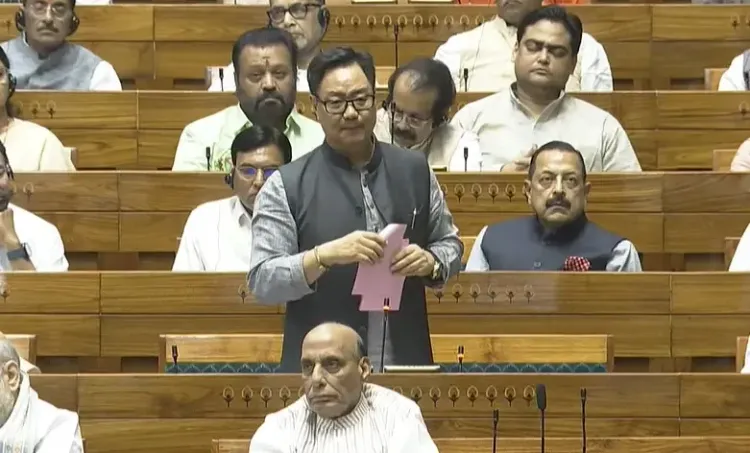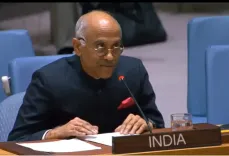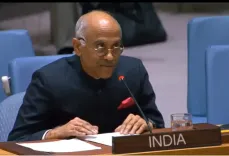Rijiju Critiques UPA for Claiming Parliament as Waqf Property

Synopsis
Key Takeaways
- Rijiju's strong critique of the UPA administration.
- Introduction of key Waqf legislation.
- Record number of consultations conducted.
- Claims about the implications for Parliament property.
- Arguments regarding religious freedoms and property management.
New Delhi, April 2 (NationPress) Parliamentary Affairs Minister Kiren Rijiju criticized the former UPA administration on Wednesday for de-notifying 123 properties and transferring them to the Delhi Waqf Board. He defended the need for the Waqf (Amendment) Bill, asserting that without this legislation, even the Parliament premises could have been claimed as Waqf property.
Despite opposition protests, Rijiju presented the Waqf (Amendment) Bill 2025 and the Mussalman Waqf (Repeal) Bill 2025 in the Lok Sabha.
In his address, he expressed gratitude to the members of the Joint Parliamentary Committee (JPC) for their comprehensive discussions and consultations, noting that the depth of deliberation on this bill was unprecedented in Indian parliamentary history.
He disclosed that the government had assessed 97,27,772 petitions received through various channels, marking a historic number of inputs for any bill in India's legislative framework.
Moreover, 284 delegations, including representatives from diverse communities, 25 state governments, union territories, legal professionals, and religious figures, contributed their perspectives.
"I hope and believe that after I introduce this bill, those who were opposing it earlier will have a change of heart and support it," Rijiju stated.
He pointed out the history of amendments to the Waqf Act, clarifying that no one had labeled it as unconstitutional or unlawful previously.
"When we are initiating positive reforms, why were such terms being used? Those not involved in the bill are misleading and inciting the public," he remarked.
Rijiju emphasized that the 1995 amendment established a tribunal system for resolving disputes over Waqf properties. It was determined that if a Waqf property generated an income exceeding Rs 5 lakh, the government would appoint executive officers to oversee its management.
He criticized the 2013 amendment enacted by the UPA government, stating, "They introduced a provision allowing any individual—Hindu, Muslim, Christian, or Buddhist—to create a Waqf property, despite Waqf being specifically for Muslims and their connection with Allah. Furthermore, they stipulated that only Shias could serve on the Shia Waqf Board and only Sunnis in the Sunni Waqf Board."
Rijiju also criticized Section 108 of the Waqf Act, which asserts that "Waqf Board provisions will always take precedence over any other legislation in the country."
"How can such a law be accepted in a democratic nation?" he questioned.
Reiterating his claims against the previous government, Rijiju stated that the de-notification of 123 properties and their transfer to the Delhi Waqf Board resulted directly from the 2013 amendment.
"Had we not introduced this legislation, even the Parliament premises would have been claimed as Waqf property... If the Modi government had not intervened, who knows how many more locations would have been de-notified?" he declared amid opposition uproar.
He dismissed allegations that the government was meddling with religious institutions, referencing Article 25(1) of the Constitution, which guarantees freedom of religion while also subjecting it to public order, morality, and health.
"The government is not interfering with any religious structure, event, or practice. The Waqf Bill is solely about property management," Rijiju clarified.
The bill builds upon the Waqf (Amendment) Bill and the Mussalman Wakf (Repeal) Bill, which had similar goals. The government anticipates that the proposed reforms will garner broad support across party lines.









